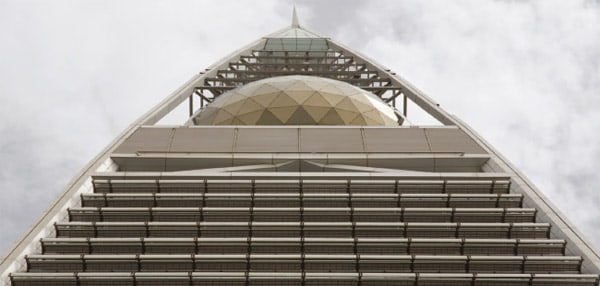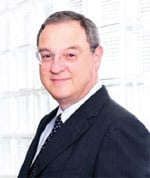MARKET MAKERS
Exchanges Upgrade Technology And Add New Products
By Gordon Platt
Financial markets across the Gulf region are working hard to enhance the breadth and depth of services they offer.

Financial markets in the Gulf Cooperation Council countries could become more active once banks loosen their tight credit constraints, the real estate overhang is cleared up, and markets become more transparent and open to foreign investment. Stock markets in the region are spending heavily on new technology to prepare for the next boom and are introducing new products and entering into strategic agreements with other exchanges in an effort to stimulate interest and trading.
Saudi Arabia, with the biggest market capitalization in the region, is continuing to develop and liberalize its financial markets. The kingdom’s stock exchange, the Tadawul, is seeking more foreign portfolio investment and recently introduced P-Notes (equity swaps) and exchange-traded funds (ETFs) to further open the bourse to foreign investors.
Adeeb Al-Sowailim, chief executive of Riyadh-based Falcom Financial Services, which introduced the first Saudi Arabian ETF, says, “This was not a quick fix. It took us three years of hard work in cooperation with the regulator and the market authorities to create a platform and connect the world to the $1 trillion investment market in the region.”
It is too soon to say how successful ETFs, which were just introduced in March 2010, will be in attracting foreign investors to the Saudi market, Al-Sowailim says. “We have seen active interest from international investors in both the primary and the secondary markets,” he says. “European banks want to take up positions in this rich economy.”
The Saudi economy proved to be resilient throughout the global financial crisis thanks to its oil resources, and as it diversifies, new opportunities will become available for private-sector participants, Al-Sowailim says. The kingdom’s record budget for the current fiscal year has a project pipeline distributed across the construction, petrochemical, oil and gas, infrastructure and power industries.
Although individual investors account for the majority of trading on the stock exchange, institutions now have a new route with ETFs, Al-Sowailim says. Saudi Arabia just needs to get the word out about the opportunities it offers to global investors, he says: “Our regulatory authorities have done the very best to open the market in stages. Remember that the capital market is new and is heavily geared toward the retail investor, and the interest of home-based investors remains paramount.”
The Capital Market Authority (CMA), which is charged with developing and regulating the country’s capital market, was established in 2003. It introduced more-stringent corporate reporting requirements and took action against insider trading. In August 2008, the CMA announced that it would allow foreign investors to invest in Saudi shares through swap agreements with authorized local firms. Previously, foreign investors could only invest through mutual funds.
“The reforms of the past decade have been carefully sequenced,” says Abdulrahman Al-Tuwaijri, CMA chairman. “The government has implemented new measures to liberalize our market in order to ensure the right regulatory framework and market infrastructure are firmly in place—and these measures are succeeding.”
Most of the large global investment banks now have a presence in Riyadh, helping to increase competition and bringing additional international financial expertise into the Saudi market, he says. “Since opening up our markets to foreign participation through swap arrangements, we have seen over $7.2 billion in trades flow into Saudi Arabia—and as foreign investors become more familiar with the market, we expect this level to grow,” Al-Tuwaijri says.
Bahrain is scheduled to open a new exchange in October that will trade multiple assets, including cash instruments (currencies, commodities and debt- and equity-related products), derivatives, structured products and shariah-compliant financial instruments. The Bahrain Financial Exchange (BFX), which is owned by Financial Technologies Group of India, aims to concentrate liquidity across the Middle East and North Africa (MENA) region, says Jignesh Shah, chairman and group CEO of the India-based company. “Asia, the Middle East and Africa are among the fastest-growing regions in the world and are expected to continue to grow annually at 6% to 10% over the next 25 years,” he says.
BFX is regulated by the Central Bank of Bahrain and has set up a Clearing and Depository Corporation for the contracts it trades. “We are in the final stages of testing and audit work, and our business-development teams have been engaging with the market to build up a solid base of membership across the MENA region in order to go live,” says Arshad Khan, managing director and CEO of BFX.
“BFX is part of the broadening of the capital market services within the economy of the Kingdom of Bahrain,” A. Rahman Al-Baker, executive director of the Central Bank of Bahrain, said in a statement. He said BFX would provide additional investment opportunities to the current services offered by the Bahrain Stock Exchange (BSE).
 |
|
Mallis: “The GCC countries will be |
The BSE is an institutional market that trades large blocks of securities, rather than a retail market, says Anthony Mallis, CEO of Bahrain-based Securities & Investment Company (SICO), the most active broker on the exchange for the past 11 years in a row. SICO is an investment bank operating on a regional basis with an emphasis on Bahrain. “The market in Bahrain is dominated by pension funds and family groups, both domestic and regional, that take a long-term approach to investing,” Mallis says. “Because the controlling groups like to hold on to their shares, there is little float and less opportunity for trading.”
As an asset manager focused on the GCC region, SICO offers regional equity funds. “With their government surpluses and huge reserves, the GCC countries will be spending a great deal of money over the next three to four years,” Mallis says. “The GCC is a work in progress. These are frontier markets with large GDP per capita,” he says.
Neighboring Qatar is creating an international exchange with the help of its minority partner, NYSE Euronext. “Our vision is to create a more liquid, more diversified exchange,” says Andre Went, CEO of the Qatar Exchange, the successor of Doha Securities Market. The exchange is planning to implement NYSE Euronext’s universal trading platform and start trading bonds by September, Went told a conference in New York sponsored by Beltone Financial. “In the next three to five years, we plan to introduce a central counterparty system and to begin trading derivatives,” he said.



